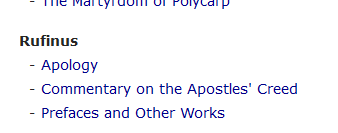Andrew
Matt 18:15
- Joined
- Aug 25, 2017
- Messages
- 6,645
- Age
- 40
- Gender
- Male
- Religious Affiliation
- Christian
- Political Affiliation
- Conservative
- Marital Status
- Single
- Acceptance of the Trinity & Nicene Creed
- Yes
Yeah, I know they weren't canon according to the Jews, the Church eventually did officially declare them canon so to not confuse Church Tradition with the 'canon' of an unbelieving Jewish sect, less we believe the word of men and not God who prepared Christianity with the books that every church would depend on before Jeromes translation.4. There are, then, of the Old Testament, twenty-two books in number; for, as I have heard, it is handed down that this is the number of the letters among the Hebrews; their respective order and names being as follows. The first is Genesis, then Exodus, next Leviticus, after that Numbers, and then Deuteronomy. Following these there is Joshua the son of Nun, then Judges, then Ruth. And again, after these four books of Kings, the first and second 1 being reckoned as one book, and so likewise the third and fourth 2 as one book. And again, the first and second of the Chronicles are reckoned as one book. Again Ezra, the first and second 3 are similarly one book. After these there is the book of Psalms, then the Proverbs, next Ecclesiastes, and the Song of Songs. Job follows, then the Prophets, the Twelve [minor prophets] being reckoned as one book. Then Isaiah, one book, then Jeremiah with Baruch, Lamentations and the Epistle, one book; afterwards Ezekiel and Daniel, each one book. Thus far constitutes the Old Testament.
5. Is about the New Testament
6. These are the fountains of salvation, that he who thirsts may be satisfied with the living words they contain. In these alone the teaching of godliness is proclaimed. Let no one add to these; let nothing be taken away from them. For concerning these the Lord put to shame the Sadducees, and said, Ye do err, not knowing the Scriptures. And he reproved the Jews, saying, Search the Scriptures, for these are they that testify of me.
7. But for the sake of greater exactness I add this also, writing under obligation, as it were. There are other books besides these, indeed not received as canonical but having been appointed by our fathers to be read to those just approaching and wishing to be instructed in the word of godliness: Wisdom of Solomon, Wisdom of Sirach, Esther, Judith, Tobit, and that which is called the Teaching of the Apostles, and the Shepherd. But the former, my brethren, are included in the Canon, the latter being merely read; nor is there any place a mention of secret writings. But such are the invention of heretics, who indeed write them whenever they wish, bestowing upon them their approval, and assigning to them a date, that so, using them as if they were ancient writings, they find a means by which to lead astray the simple-minded.
It is clear that he differentiates between the "Old Testament" and "other books". And that these other books are not included in the Canon but to be "merely read" for instruction in godliness.
Did God bless the Jews by inspiring them to set a canon to give to the Nations?
Or did God bless the Nations with Scripture so that no Goat could tamper with them?
Had Jerome gone to the Samritan sect and found that everything outside of the Pentateuch was acporypha? It would make Jesus a gnostic cult leader.
Had Jerome truly accepted the Hebrew as the final cut of the canon of God's Word, the Gospel would be Apocrypha.
Yet even they are found guilty had they accepted the book of Wisdom (chapter 2) so why not make the claim that ever since Moses, God had communicated through men to write down his words, but all of a sudden God gave them 400 years of silence, and to Jews today, God remains silent and no Messiah has come according to Daniel's timeline.
No, God never kept His silence, the Prophets of Gods word whome the Jews cut off prematurely, ended with the deaths of last Apostles...them of the New Testament.
Jews today no longer plead for the coming of Messiah as we do for His second coming. They are saved by their Jewish DNA and/or the Torah, if you ask them if the Messiah is necessary for their salvation they will NOPE!!!


